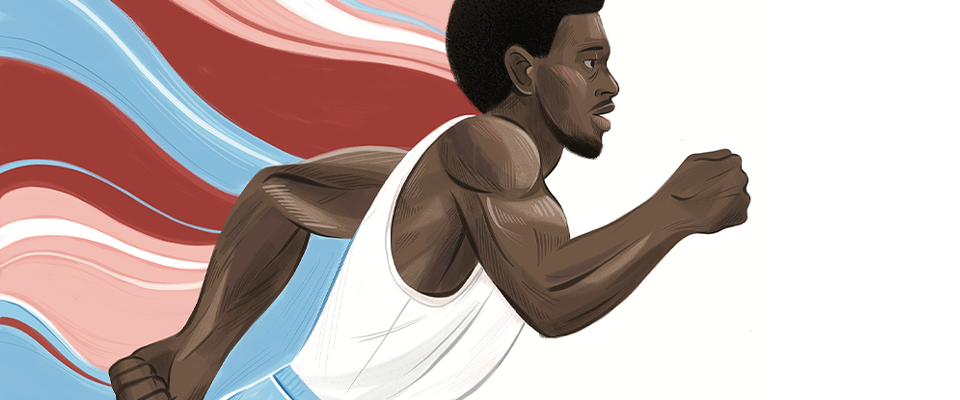Coming to grips with the nature of nurture
I knew parenting would be trouble even before it began. Back when my wife, Beth, and I were just starting to think about having a child of our own, I asked my dad about baby sleep arrangements. Dad’s a psychotherapist specializing in the ways that early childhood experience shapes adults, and he has strong feelings about this stuff. Forcing babies to sleep alone, he said, ends the period (starting in the womb) in which children understand themselves to be part of a larger whole.
“They lose that feeling of being at one with a nurturing universe—and instead feel like an isolated being, fighting for survival,” Dad said. “And of course you know that I’m speaking from my own experience.” This wasn’t the first time Dad had told me that the most blissful period of his life abruptly ended when his own father, back from the war, kicked him from the family bed. “I was left alone in the dark,” he said.
He also made an evolutionary argument for keeping babies and parents together. For the great apes, being left alone in infancy is a death sentence. And in nearly every other human culture, babies stay close to their mothers. Babies, Dad said, have no way of knowing they are not in the savanna, prey to jackals and snakes.
“When a child is left to cry it out, they go into extreme and utter panic. They think they have been abandoned and they are going to die. Because of this trauma we have an entire culture of people who are terrified of being alone—or who flip to the other extreme and make a virtue out of a John Wayne-like self-sufficiency. It’s a huge challenge for people in relationships later on in life.”
I’m often tempted to roll my eyes at this sort of thing—I’ve endured decades of my parents’ arguments for nature’s way, and I know all too well how unhealthy nature can be. After all, human history has been one long struggle to keep the natural world from eating us. But I also know that sometimes their ideas contain at least a kernel of truth, and what seems like craziness can turn out to be clarity in places where conventional wisdom is blind.
Central to my parents’ theories of natural health was the idea that human health and the health of the Earth are connected. Indeed, a growing body of science suggests that we have underestimated the importance of ecological relationships—with the creatures inside us, with the creatures we eat, with the creatures that shaped our evolutionary history, and with other people. The mainstream medical perspective has long viewed the body as a complex machine. It’s an apt metaphor in many ways, but one that tends to miss the equally important ways in which the body is an ecosystem.
After that conversation with my dad, I spent the rest of the morning Googling anthropological literature on bed sharing, and reading statistics on unexplained infant deaths. Around noon, Beth came home with a bag of groceries and brought me lunch. She received an inquisition for her trouble.
“You aren’t going to isolate our baby in a crib, all alone in another room, are you?” I demanded.
She paused to take my measure. “Is this another one of your theories?” she finally responded.
“C’mon. I’m serious: Why are you against cuddling with babies?”
She started laughing. It’s one of my favorite things about her—her laughter. She laughs like a little girl, which is to say, at little provocation, and it builds upon itself until I’m laughing, too—even when I’m feeling self-righteous and pretty sure the humor is at my expense.
“What?” I finally asked.
“I’m also against snuggling fuzzy puppies. Actually, I oppose puppies in general. Fine, I’m curious: What have you learned?”
This argument over where babies should sleep, like pretty much any question regarding the do’s and don’ts of parenting, is divisive. And very often the division occurs along mainstream/alternative lines. On one extreme are those who simply accept convention, sneering at doubters as unscientific, benighted hippies. On the other side are those who are reflexively suspicious of convention yet credulously embrace alternative ideas, no matter how crackpot.
The division certainly exists in my own family. My folks mixed their parenting with a little Native American spirituality and a lot of backpacking. Beth’s parents are more traditional: East Coasters who are into sailing, dinner parties, and fiscal conservatism. My dad is a psychotherapist—he works on dreams and emotions. Beth’s father is an orthopedic surgeon—he works on bone and muscle. A few months after I was born at home (in Berkeley), she was born via scheduled Caesarean section (in Fort Lauderdale, Florida). We met somewhere in the middle: She’s a nurse practitioner in San Francisco’s Tenderloin who tends to trust the official dicta from health officials; I’m a nature-loving journalist who’s somewhat more skeptical of medical orthodoxy.
There are many ways to resolve these kinds of cultural schisms. My way is to bury myself obsessively in research—so much so that I ended up writing a book about what’s natural and what’s healthy. But, as I found, the research will only get you so far. There just aren’t hard and fast answers to many parenting questions, and as a result we tend to slip back to our own upbringing for guidance.
Beth wants to protect the baby from the sunshine; I want to protect her from the sunscreen. I say, “There’s no reason to give the baby sugar,” which was banned in my childhood home. Beth, who had unfettered access to the ice cream, says, “Just a little bit so I can see her face light up!” Beth was totally comfortable with childhood vaccinations, while I was spooked by them (until my research showed each purported cause for concern to be unfounded).
Sometimes, though, we switch roles. I’m all for organic food, but I’m actually less concerned than Beth is about the health consequences of pesticides. And though I was a diaper-free baby throughout my infancy, I was the one arguing to stock up on Huggies. (Now that the baby has developed a serious, World War I-grade case of trench butt, however, I’m starting to wonder if my parents had the right idea.)
By the time my daughter was born, I thought I’d found a sleeping arrangement that brought evidence and emotion into accord. We put our bed on the floor, with a baby mattress jammed up against it. I’d weighed all the science, seen past cultural prejudice, and found a setup so rational and nurturing, I was sure our baby would sleep soundly and never cry.
She barely slept at all in her first three weeks. She cried inconsolably for hours on end. She would beg desperately for milk, then hyperventilate at the breast, shaking her head from side to side with her mouth open, as if possessed by a boob goblin. What’s worse, because I’d believed that my master plan would guarantee a happy baby, I now took her distress as a sign of my failure—or her damage. God, I thought, she’s broken. She’s incapable of love. After four nights, I tossed all the reading I’d done, all my father’s advice, and all my own plans out the window. Beth and I were scrambling, grasping at any possibility for sleep.
Occasionally the baby would sleep on her little mattress as planned, but often she was in our bed—with us, or sleeping there on her own (while I napped on the couch). Eventually, I noticed that once we gave up on plans and theories and began to pay attention to the squirming creature in front of our faces, things got easier. The flexibility freed us up to tinker our way toward real solutions. We adjusted to her quirks and she to ours.
Finally, it just made sense to get a crib. We established a comfortable routine: The baby started in the crib, sometimes sleeping through the night, more often waking to demand a midnight snack. After a year, however, this no longer seemed so comfortable, and we were desperate to get back to eight hours of uninterrupted sleep. Reluctantly, we decided there was nothing left but to try the cry-it-out treatment—the kind where they recommend you put down a waterproof sheet because babies sometimes cry so hard that they puke.
We made strict rules for ourselves: Check on the baby only after 10 minutes of crying; no nursing. We hardened our hearts and when the crying began, we braced ourselves. Two minutes passed, and it felt like 20. We soldiered on through minute 3.
Then something strange happened: The crying softened, tapered off. Beth and I looked at each other. A minute of silence was followed by another. She was asleep.
For a parent, certainty is hard to come by. It’s difficult to know whether the computer is going to rot your child’s brain or turn him into the next Steve Jobs. Who knows if your kid is being slowly poisoned by endocrine disruptors from plastics, or for that matter by the naturally occurring toxins in some vegetables?
There is one thing, however, that you can be certain of: Children will defy expectations. You can spend hours in the library poring over the research. You can seek out one parenting guru after another. In the end, though, a child isn’t a problem with a solution. There are solutions—thousands of them—but every child is so different, and so fiendishly adaptive, that it’s hard to generalize any sort of plan. Science is only marginally helpful in navigating this territory.
We muddle through, using the best information and advice we can get. But ultimately, we (Mom, Dad, and Baby) have to figure it out on our own.





















